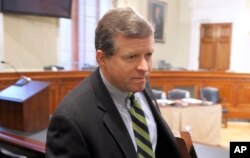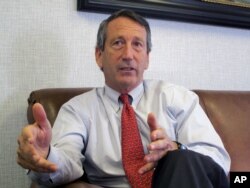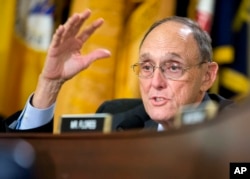Top congressional Republicans claimed party unity after meeting Thursday with presumptive presidential nominee Donald Trump, even though dozens of lawmakers shunned the encounter and others withheld endorsing the candidate less than two weeks before the Republican National Convention.
“We had a great meeting,” House Speaker Paul Ryan said in a statement. “It was an important opportunity for our members to get additional information about Mr. Trump’s campaign and ask questions about issues that matter to Americans.”
“It’s clear that our party is committed to defeating Hillary Clinton and Democrats this fall,” Ryan added.
Trump concurred via Twitter.
"Had great meetings with Republicans in the House and Senate," he said. "Very interesting day! These are people who love our country!"
Trump met behind closed doors with House and Senate Republicans at separate venues near the Capitol. It was Trump’s second pilgrimage in the last three months to reach out to lawmakers of his own party, many of whom plan to skip the Republican National Convention in Cleveland, Ohio, that begins July 18.
Dent unpersuaded
Pennsylvania Representative Charles Dent met Trump for the first time Thursday. He confirmed he would not go to Cleveland, saying his opinions of the nominee-to-be had not changed.
"I’ve been expressing my concerns about the many incendiary comments [by Trump], the lack of policy specificity," Dent said. "The few policies that we have heard have often been contradictory and conflicted. So those have been my concerns walking into the meeting, and they’re still my concern now."
Others emerged decidedly upbeat.
“We need him [Trump] to win,” said Representative Joe Barton of Texas. “We’re tired of having a President Obama and we don’t want a President Clinton.”
Tennessee Representative Phil Roe said Trump was engaging and made a good impression before a “tough crowd.”
“The most reassuring thing he said was that we needed to work together, and we do,” Roe said. “We have to — if we’re going to win this race, the race for president — we’re going to have to work together as a team.”
Representative Mark Sanford of South Carolina was noncommittal after listening to Trump.
“I think the room was generally receptive and there are some folks that still have some questions. I remain to be one of them,” Sanford said.
That some Republicans skipped the meeting was no surprise. Senator Mark Kirk of Illinois is openly campaigning against Trump, going so far as to run television ads saying the presumptive nominee "is not fit to be commander in chief."
Other Republicans offered a range of excuses for their absences, from scheduling conflicts to a doctor’s appointment.
Even if Trump earned few new endorsements, he did not leave Capitol Hill empty handed. One of his fiercest rivals for the nomination, Texas Senator Ted Cruz, told reporters he agreed to speak at the national convention. Cruz' participation had been in doubt since a bitter, often personal feud broke out between him and Trump in the final weeks of the primary campaign season.
Roe said Trump’s goal at the meetings was to “bring us [Republican lawmakers] on board” with his campaign. The Tennessee lawmaker said he believed Trump had succeeded.
'Far from the norm'
But the very fact that Trump felt compelled to corral the support of his party’s congressional foot soldiers as he prepares to receive the party's presidential nomination caught the attention of political analysts.
“It is not uncommon for a nominee to meet with his or her party’s House and Senate members during the campaign to discuss plans or brief members on strategy,” said John Hudak of the Brookings Institution, a Washington public policy research group. “However, Trump’s appearance on Capitol Hill, particularly so far along in the campaign, in an effort to gather support and stop criticism from party members is far from the norm.”
“There's no recent precedent for Trump's difficulty securing his party's congressional support,” concurred political analyst Sarah Binder, also of Brookings. “[Republican] Barry Goldwater's 1964 campaign might come close, though: Senate Minority Leader Everett Dirksen refused to endorse Goldwater until two weeks before the GOP convention.”
Democrats on Capitol Hill, meanwhile, largely avoided immediate commentary on Trump’s meetings. Senate Minority Leader Harry Reid of Nevada, who regularly rails against Trump on the Senate floor, did not mention Trump during 10 minutes of comments after the chamber gaveled in.



